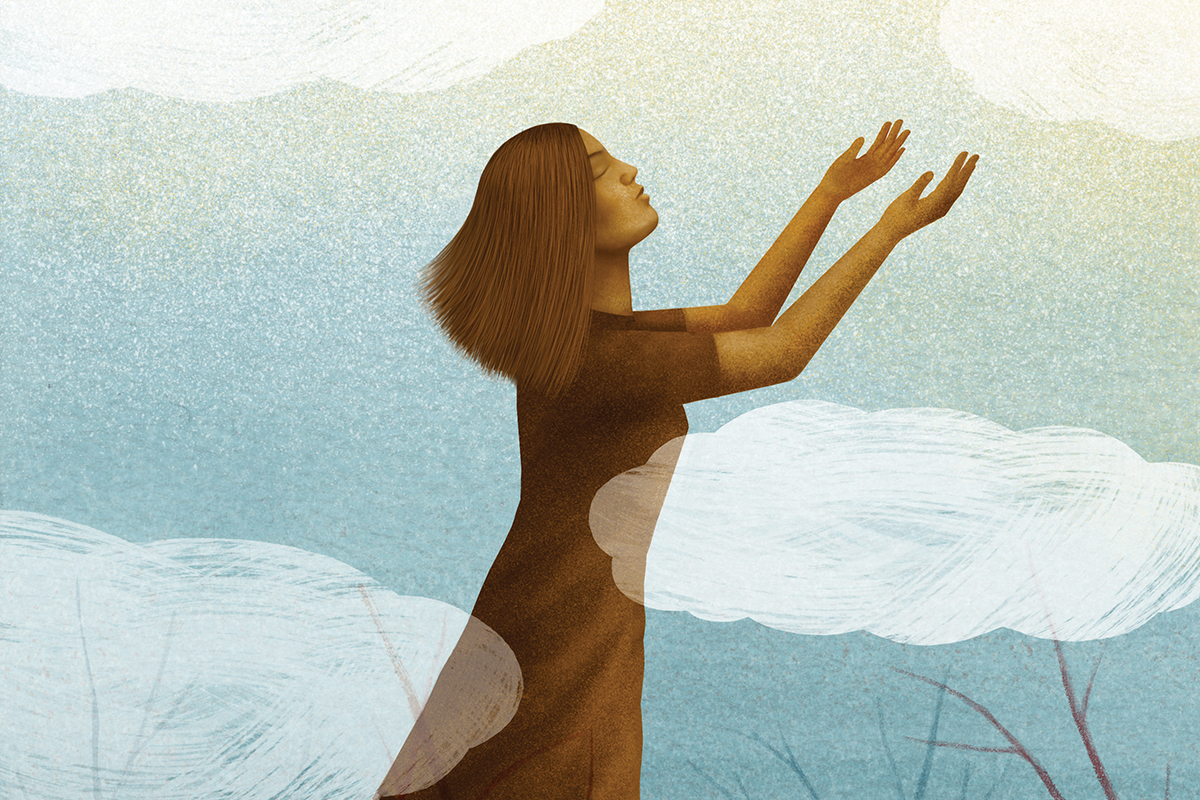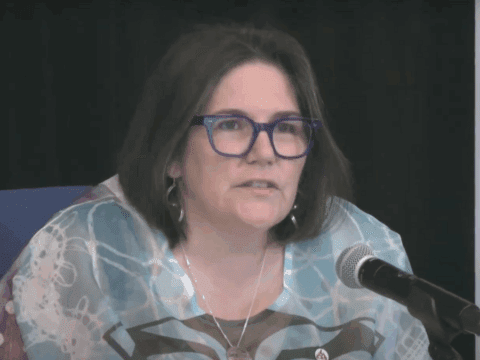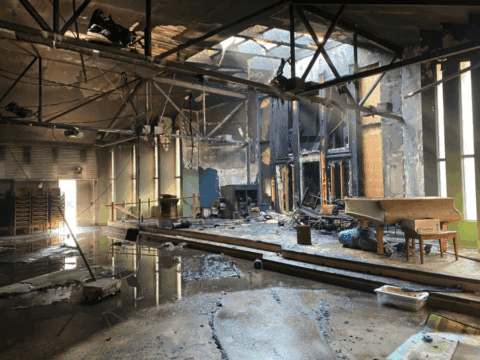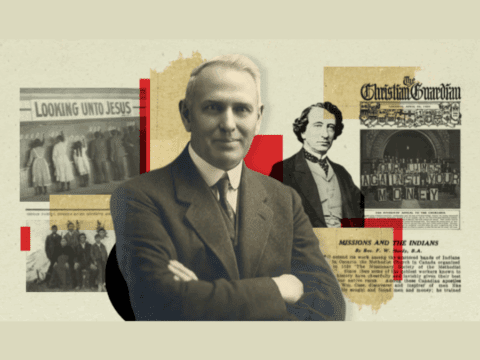On the surface, everything was fine.
My job at the university was rewarding and secure. My partner and I were happy enough, with a comfortable house in the country, the mortgage almost paid off. I was lucky, I knew that.
The only problem was this gnawing restlessness inside, something chronically out of alignment, a tension I could not name. It was as though I had turned a wrong corner somewhere and ended up in someone else’s life.
It was a good life, and I had worked hard for it. It just didn’t feel like my own.
Often, in the thick middle of the afternoon, a wild cry would knot up at the base of my throat. I wanted to shout out my yearning for something other, something more, yet I had no idea what that might be. This upswell was further stifled by a sense of shame that I could have so much and still feel as if something essential was missing. Driving home at the end of the day, I imagined what it would be like to just keep on going, driving and driving, searching for the lost part of me, desperate not to grow old and realize I had never known who I really was or what my life was all about.
This itchy restlessness, I knew, was not mine alone. Contentment? What was that? A quick tour of popular culture — song lyrics, movie plots, newspaper headlines, social media feeds — reveals that we are not peaceful beings, at ease with our existential lot. In any given moment, our minds are likely to be preoccupied, pitching and tossing in a choppy sea, churning away over agitations great and small. Deep in our core, something is routinely at odds with the very rhythm of things. We ache to somehow reach beyond, to transcend where and what we are. This sense of yearning drives us forward — without it, we don’t go anywhere. But what happens when it veers off course? As I discovered, sometimes longing leads us to strange and unexpected places. Understanding what our spirit is trying to tell us in these unforeseen detours is often the work of a lifetime.
In my case, most of my nagging restlessness during that period centred on the challenges of my job, where I felt stuck in overdrive, always on edge. I longed for a quiet stretch of time where I could read, reflect, gather my thoughts. The scholarly work I desperately wanted to be doing kept slipping out of sight amid other daily demands. At the computer, I often found myself plunging down an internet rabbit hole, looking for getaways, writing retreats, cottages in the woods — anyplace where I might find some stillness.
And then, finally, there it was.
Studium. A program for scholars offered by a community of Benedictine women in central Minnesota. “Studium places special emphasis on the love of learning, honoring scholarship as a sacred ministry,” stated the website, right next to a serene image of the 12th-century mystic Hildegard of Bingen at her desk. The program was designed for writers, academics, artists, anyone needing “some time away from daily distractions in a place where thinking and writing are nurtured and supported.”
It sounded perfect. I filled out the application that very evening, requesting a four-week stay. Within a few weeks, I heard back that I was welcome to come for the month of July.
At last. Here was a chance for the quiet reflection I had been craving.
At first, Studium fulfilled all my hopes. My room was comfortable, and the monastery grounds were green and tranquil, surrounded by gently waving cornfields. I was not a Catholic or even much of a churchgoer at the time, so I had worried that the monastic setting might feel austere or claustrophobic. But the sisters were warm and approachable, the atmosphere more like a rural college run by friendly grandmothers than a hushed cloister.
Participation in daily prayers was not required, but I usually went once a day. I loved the slow antiphonal recitation of the Psalms, with a pause between each line. Here was the deep time I had longed for, as though settling into the rhythm of the heartbeat of God.
Within a few days, however, the old restlessness began to stir. My eyes drooped over my notes whenever I sat at my desk. All the books I had so looked forward to reading were impenetrably dense and abstract. My own thoughts were a tangle. I was still keenly interested in my project. But whenever I tried to gather words into a coherent paragraph, they kept crashing together like bumper cars. My head felt stuffed with dusty straw, devoid of an original idea.
One of the most unexpected things about my monastic room was that it came with a television. It struck me as ironic to find such a thing there, in a place set apart from the distractions of popular culture. I had not watched television for years, did not even own one at home. But one evening, after a few more days of unsuccessful wrangling at my desk, I crossed the room — it was an old-fashioned set, with no remote — and turned it on.
After flipping through the channels a few times, I settled on a medical drama. An attractive doctor with soulful eyes and a dark strand of hair falling over his forehead was helping a pregnant woman breathe through her contractions. His voice was husky but kind, with an unplaceable accent. The story frequently cut away to other plot lines, but I kept watching for further glimpses of that doctor, those eyes. I sat on the floor right up close to the screen to keep the sound down. Even though the television came with the room, I wanted no one to know I had actually stooped to watching it.
Over the next few days, my thoughts strayed frequently to the mysterious doctor. The program, I learned, was ER. It was now several seasons in, with reruns seemingly broadcast at all times of day. The doctor — my doctor — was played by a Croatian actor, stepping in after George Clooney to be the new heartthrob. It was the air of buried trauma projected by his character that drew me most — the wounded healer. He was such a haunted-seeming soul, Heathcliff in scrubs. And that look, when he rushed forward to save the life of the next bleeding person wheeled in on a gurney, that depth of compassion when he put his own life in danger. What was the harm if I watched just one more episode?
As the days went by, to my mortification, I became increasingly drawn in. The world portrayed in the program, with its throbbing soundtrack and swirling emotional intensities, took on a life of its own. My own life felt stale, bleached, empty in comparison. And Dr. Kovač. Luka. Oh my. Even his name caused a flutter at the base of my spine. Just thinking about him — character or actor, the distinction blurred — became a background constant, prickling under my skin. When I wasn’t watching the show (still with the sound low) or surfing the net for the backstory, imaginary scenes repeated over and over in my mind with him in the starring role — saving the day, taking the bullet, running toward danger.
What on earth was I doing getting caught up in this drivel? I was at a monastery, for goodness’ sake. In an effort to get all this foolishness out of my system, I began attending prayers a few times a day. Perhaps this immersion in the holy Word would cleanse and reorient my thoughts toward loftier, more spiritual things.
The language of the Psalms recited seemed to echo and amplify my heated inner state. It was as though those ancient Psalmists had looked right inside me and seen the naked truth.
To my dismay, however, the language of the Psalms recited in the daily offices just seemed to echo and amplify my heated inner state. It was as though those ancient Psalmists had looked right inside me and seen the naked truth. In vivid, visceral poetry, they articulated the sense of desolation that had brought me to the monastery in the first place and was rearing up all over again in my incapacity to tame my thoughts or make my words cohere.
“I am poured out like water, and all my bones are out of joint. My heart is like wax; it is melted within my breast. My mouth is dried up like a potsherd, and my tongue sticks to my jaws” (Psalm 22:14-15).
And all the irrational intensity of attraction that had flared up over a television character — they saw that too: “As a deer longs for flowing streams, so my soul longs for you” (Psalm 42:1).
I knew I was supposed to be thinking about God, but I felt such a resonance of aching desire in the verses we were reciting, so much fevered thirst, that we might as well have been reading from the sultriest of love stories.
“My soul thirsts for you; my flesh faints for you, as in a dry and weary land where there is no water” (Psalm 63:1).
“Our hearts are restless,” St. Augustine famously confessed at the turn of the fifth century. Nothing has changed. Human yearning never seems to be fully and finally satisfied. Hildegard of Bingen used imagery from nature to say the same thing: “Like billowing clouds, like the incessant gurgle of the brook, the longing of the soul can never be stilled.” And the Psalms, as I so powerfully discovered at Studium, are full of gripping language about hearts that chronically pine, pant, long, ache, yearn and thirst. Our spiritual literature brims with references to the persistent sense of incompleteness and desire that simmers at our core, aching for greater connection with what philosopher William James calls the “more.”
None of these thinkers, of course, were talking about an intense attraction to a television character. It may even seem far-fetched or sacrilegious to mention this type of desire in the same breath as the yearning of the soul for the Divine. But in its rich and varied forms, longing has a way of making its presence felt — not only in the dreams that propel us forward, but also in the wayward fantasies that sometimes threaten to pull us into the ditch.
This is not to say that all types of longing are created equal. On the positive side, there is the longing that reflects a lifelong impulse toward transcendence, to go beyond. Firing our greatest gifts, it comes forth as creative expression, a sense of adventure, the movement toward authentic love and relationship, compassionate action for the greater good, intellectual searching and all manner of human blossoming.
But longing also has a shadow side, a tendency to balloon out of control or to fasten on things that can be toxic and dangerous — gambling, drugs, extramarital sex. The force of longing, its unquenchable power, has a wildness to it that is never quite comfortable. Much of our misery comes from the push and pull between indulging our desires in all forms of excess, and trying to lock them up until they wither away. Too much of either extreme is likely to lead to trouble.
For this reason, all manifestations of longing are worthy of our attention: they are sources of deeper self-understanding. Perhaps it is even the unruly ones, the ones that hijack us from out of the blue, that are in fact telling us the things we most need to hear, offering vital insight into the parts of ourselves that are most hidden and unacknowledged.
After I got home from Minnesota, it took a while for things to settle down. Back on familiar turf with no access to a television, I could no longer indulge the impulse to keep tuning in. But the aftermath still hung in the air, like smoke after a fire.
When I told my partner, rather sheepishly, what had happened, he was more amused than unsettled. Some of my friends shared their own stories of being ambushed by riotous attractions, whether to fictional sleuths like Magnum, P.I. and Lord Peter Wimsey, or the guy working down the corridor. Often, the objects of our desire reflected unrealized aspects of ourselves. It wasn’t Magnum’s macho looks but the balance between strength and tenderness in his character that compelled my friend. For me, the ER doctor’s hidden sorrow somehow allowed me to connect with my own.
At first, I worried that I had let Studium and the Benedictine sisters down, not properly living up to the spiritual values of the program. Gradually, however, in conversation with several other monastic women over the years who did not seem to find my experience at all surprising, I came to see that perhaps the “love of learning” the program aimed to support was not just intellectual scholarship but the deep, difficult learning of the soul.
Paying attention to longing, in all its infinite varieties, is of central interest to spiritual directors like Barbara Sheppard, who leads retreats at the Sisterhood of St. John the Divine convent in Toronto. “We often think going on retreat will bring us into a place of stillness and calm,” she says. “However, it is often the times of silence and solitude, the context of prayerfulness, that can actually open us up to the buried longing we have been neglecting.” When Sheppard is working with retreat participants, “longing is the first thing I want them to be in touch with,” she says. Otherwise, they risk keeping to the surface of things, going through the motions of holiness.
When it comes to the more unruly eruptions of longing, the call to notice is even more imperative, but also challenging. “In spiritual direction, we call them ‘hot spots,’” says Jeff Imbach, founder of SoulStream, a spiritual training centre in Abbotsford, B.C., and the author of The River Within, which explores the theme of living passionately as a way of living deeply. Hot spots are the uncomfortable flare-ups of urgency that sometimes seem to claim us from a place outside our control, and can feel more perilous than life-giving. We become addicted, obsessed, unmoored.
These aspects of our identity can be scary or embarrassing, like going into a dark basement or lifting a rock to see what’s crawling underneath. But unexamined, they leave us blind to the motives for our own actions. To be healthy in one’s soul, writes Rev. Ronald Rolheiser, a Catholic priest and author of The Holy Longing, “the way to clear our eyesight is precisely through radical honesty, through courageously facing the truth of our own weaknesses.”
The temptation, when comparing our spiritual life to something like an impossible infatuation, is to assume they exist on separate planes of experience. Spirituality is what we like to think our better self is up to. A ridiculous TV crush is just something to sweat through, like a summer fever, without attuning to its spiritual dimension.
But if we start to ask ourselves questions, a more complex truth emerges. What is the crush saying about the condition of our heart, something in our soul that is being stirred? Is there some part of our life we are overlooking? Something ignored, something forgotten in our everyday routines? The euphoria of attraction can often serve as a kind of blindfold. Gently removing that blindfold allows us to see the deeper longing at its core.
When I set off for Studium, the last thing I thought I would ever do was turn on a television and be smitten by a fictional tall, dark stranger. This experience took me to a place I had no wish to go. Yet in the end, it also took me in exactly the direction my heart — or soul, spirit, inner self, call it what you will — was beckoning me to take.
What I realized was that over the years, I had been gradually squeezing myself into a tighter and tighter intellectual straitjacket that was choking off my emotional roots. The vivid intensities of the crush and the Psalms combined were like a psychic pie in the face saying, “Look at me!” It was as though they had ganged up, hitting me with a double whammy from completely different directions, to get the point across. It was a wake-up call from the heart-and-body parts of myself that had been so starved for air.
That was 14 years ago.
My floundering research project was never finished. With a sigh of relief, I began writing more creatively, often turning to the Psalms — even the vengeful, angry ones — as a source of inspiration. And five years and much soul-searching later, I left my secure but unsatisfying position at the university for the more uncertain but deeply enriching path of becoming a writer and spiritual director. My experience at Studium was not the only prompting that sparked this slow work of change. But when I look back, I see it as an important message from the deeps, helping to crack open the part of me that needed to be cracked open for new growth to happen.
“Where have you hidden, Beloved, and left me moaning?” wrote the Spanish mystic John of the Cross in the first lines of The Spiritual Canticle. “You fled like the stag after wounding me; I went out calling you, but you were gone.” The understanding of our spiritual condition John sketched so movingly in these lines is that each of us wakes up in the middle of a love story. Someone has touched and wounded our hearts, leaving us to call out in the ache of our loss. Who has done this? Where has the absent one gone?
This is the yearning that aches in our hearts. These questions haunt and propel every step of our onward journey, sometimes leading us closer to the prospect of (re)union, sometimes pulling us into further bewilderment and loss. When longing entangles us, it can be hard to find our way clear. But even a seemingly frivolous infatuation can be a catalyst for spiritual awakening when we seek out its roots. Cut off from its source, desire risks becoming toxic or stunted. Connecting with that source means opening to the truth about our lives and letting ourselves be transformed.
This story first appeared in The Observer’s September 2017 issue with the title “Yearning.”















